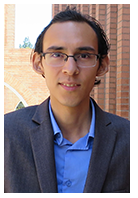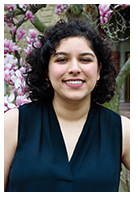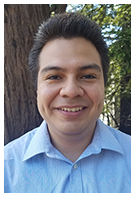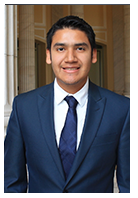The following students were named as 2019-2020 APSA Minority Fellowship Program recipients during the spring 2019 application cycle. These fellows are currently in the first or second year of PhD programs in political science.
- Michael Chacon , Arizona State University
- Keith Padraic Chew, University of Texas at Austin
- Reva Dhingra, Harvard University
- Julie George, Cornell University
- Edward Gonzalez, University of Southern California
- Chelsea N. Jones,University of California, Los Angeles
- Kanika Khanna, Cornell University
- Ahmed Kodouda, George Washington University
- Adam Le, University of Minnesota
- Adan Martinez, University of California, Berkeley
- Jair Moreira, University of Illinois
- Surili Sheth, University of California at Berkeley
- Jasmine Smith, Duke University
- Terri Smith, University of Chicago
- Bianca V. Vicuña, University of California, Los Angeles
- Randy Villegas, University of California, Santa Cruz

Michael Chacon graduated summa cum laude from Arizona State University in 2013 with degrees in political science, history, and communication. In 2017 he completed his MA in international business at the Thunderbird School of Global Management. Currently, Michael is a PhD student studying political science at Arizona State University. His focus is on American politics, specifically political parties and the power of partisanship. His proposed research agenda focuses on the root causes of political polarization at the elite level.

Keith Padraic Chew is a PhD student in the department of government at the University of Texas at Austin studying comparative politics and methodology. Prior to beginning his graduate studies, Keith graduated with a BA in humanities (war, security, and intelligence), Asian Cultures and languages (Chinese), and government. His research interests include party politics, ethnic politics, and comparative political regimes. In particular, Keith’s research focuses on factional party politics in East and Southeast Asia through the lens of ethnicity, gender, and age. As an immigrant from Singapore, first-generation college graduate, and graduate student, Keith is committed to diversity and representation in political science. Upon completing his doctorate, Keith will pursue a career in academia.

Reva Dhingra is a PhD student in the department of government at Harvard University. Her fields are comparative politics and quantitative methods, with a focus on forced migration, international aid, and the politics of non-state service provision. Reva graduated from Brown University with a BA in Middle East Studies and international relations and was elected to Phi Beta Kappa her junior year. She was a Fulbright Student Fellow in Jordan, where she researched education provision for out-of-school Syrian refugees. From 2015-2017, she worked on the Syria Regional Response team at the International Rescue Committee, where she supported humanitarian programming for individuals and communities affected by the Syria and Iraq conflicts. Her current research examines local government responses to refugee presence and access to public and non-state services for refugees and vulnerable host community members. At Harvard she is also involved in advocacy on preventing gender, race, and other identity-based discrimination and sexual harassment in academia.

Julie George is a PhD student in the department of government at Cornell University, specializing in international relations. Broadly, her research examines the nexus of nuclear proliferation and emerging technologies, and its impact on the probability and nature of conflict and cooperation in the international system. Julie is currently coauthoring two projects: one concerning the patterns of recruitment and accession in the Missile Technology Control Regime, and the other regarding the accommodation and integration of refugees in South Asia. She is also interested in historical archives, foreign policy, wargaming, and quantitative methods. Prior to beginning her PhD at Cornell University, Julie worked at the Atlantic Council and completed a graduate fellowship at the Nonproliferation Education and Research Center (NEREC) housed at KAIST University in South Korea. Her previous work included research on nuclear and cyber security in East and South Asia. Julie has a BA and MA in political science from Boston University, where she received the Best Thesis Award.

Edward Gonzalez is finishing his second year as a graduate student in the political science and international relations (POIR) PhD program at the University of Southern California. Edward earned his BA in political science from California State University, Dominguez Hills, graduating summa cum laude. In addition, he earned his MA in political science from California State University, Long Beach, where he focused on international relations and political theory. As a PhD student at USC, Edward has served as co-president of the POIR Graduate Student Association for the 2018-2019 term, organizing academic professionalization events and representing the POIR graduate student body. In addition, Edward participated in the Center for Excellence in Teaching’s Future Faculty Teaching Institute at USC, where he studied best teaching practices for future scholars. His fields of concentration are international security and foreign policy (ISFP) and comparative politics. His research interests include nuclear proliferation, transitions to democracy and reversals to authoritarianism, international security, democratic peace theory, and war. Currently, Edward is working on an ideational theory of nuclear reversals, which would employ mixed methods research to explain why some countries abandon their nuclear weapons development programs.

Chelsea N. Jones is a PhD student and Eugene V. Cota-Robles Fellow in the political science department at UCLA. She is currently studying race, ethnicity and politics where her research focuses on the role of political racism in facilitating maternal health disparities. Chelsea’s research interests are centered on racial equity, local government/public policy and the modern-day Black Church. Prior to attending UCLA, Chelsea conducted research on the teenage pregnancy crisis in her hometown, Dallas, TX as an Urban Leaders Fellow. She has previously worked as a policy analyst at the National League of Cities, a Congressional fellow for the US House of Representatives, and an equity specialist with the Texas Health and Human Services Commission. Chelsea will pursue a career in academia where she can influence both the next generation and current political leaders to implement equitable policies. Chelsea holds an MS in public policy from Carnegie Mellon University and a BSW from the University of Texas at Austin where she was a Ronald E. McNair Scholar.

Kanika Khanna is a first year PhD student at Cornell University. Her primary subfield of study is American politics, with a minor in comparative politics. Broadly, her research interests include public policy, race and ethnic politics, inequality, and urban politics. Currently, she is exploring how communities of color in New York City perceive the capacity of city government to address housing inequality in a racially equitable way. Kanika holds a BA in political science from CUNY Macaulay Honors College at the College of Staten Island and an MPP from Brown University. Prior to enrolling at Cornell, she worked as a policy analyst for the NYC Department of Investigation and as a consultant for nonprofit organizations focusing on homeless individuals and families with special needs.

Ahmed Kodouda is a PhD student at George Washington University, studying comparative politics. His research interests include ethnic politics, civil war and democratization in sub-Saharan Africa. In 2019, Ahmed was awarded the National Science Foundation’s Graduate Research Fellowship. Prior to graduate school, he worked for various organizations in Kampala, Khartoum, Nairobi and Washington, DC, including the Aspen Institute, Freedom House, and Saferworld. Ahmed received his BA in international relations from Bucknell University.

Adam Le is a PhD Student in political science at the University of Minnesota. He graduated from San Jose State University in 2017 with an Honors Bachelor of Arts in political science and a minor in Mexican-American Studies. At Minnesota, Adam uses his specializations in American politics and political theory to examine the effect of solitary confinement, mass incarceration, and the school-to-prison pipeline on marginalized communities of color. In his dissertation, he hopes to use mixed-method approaches to illustrate the political and social consequences of imprisonment at the local, state, and federal levels in the United States. Adam’s current projects examine the consequences of family separation as a result of incarceration, though his previous work has included subjects such as the relationship between imprisonment and citizenship as well as the role of prosecutors in mass incarceration. After completing his PhD, Adam hopes to pursue a career in academia and to continue advocating for alternatives to incarceration and criminalization.

Adan Martinez is a PhD student in the Charles and Louise Travers Department of Political Science at the University of California, Berkeley. His fields of concentration include comparative politics and political behavior. Adan's research interests include the intersection of ethnic cleavages and the provision of public goods, the urban politics of development, and more broadly, questions of state capacity in Latin America. Prior to beginning his doctoral studies, he served as a Legislative Assistant in the Minnesota State Legislature researching drug policy and criminal justice reforms. Adan earned his BA in political science and Latin American studies from Macalester College.

Jair Moreira is a PhD student in the political science department at the University of Illinois at Urbana-Champaign. His focus is American politics and he is minoring in comparative politics. He obtained a BA with honors in sociology, as well as a BA with honors in urban studies from the City University of New York-Hunter College, where he graduated summa cum laude. As an undergraduate, Jair was a McNair Scholar (2016-2018) and had the opportunity to participate in Michigan State University’s Summer Research Opportunity Program (2017) as a research assistant. He has received several other awards and scholarships, including the Karl Leubsdorf Memorial Graduate Scholarship (2018), an award for his outstanding roundtable presentation at the Illinois Summer Research Symposium (2018), the Aspire Fellowship for Underrepresented Minority Students (2018-2019, 2020-2021) and the Eva Kastan Grove Award (2017). His research and teaching interests include political psychology, immigrant political behavior, immigrant political integration, policies of diversity, public opinion, and citizenship in the United States. This summer, Jair will use the APSA MFP Fellowship to implement an experimental study analyzing the effects that negative political rhetoric have on immigrant political attitudes towards in-group favoritism and inter-group cooperation.

Surili Sheth is pursuing a PhD in political science at the University of California at Berkeley. Her research interests center on social identity (such as gender, religion, and caste), public service delivery, institutions and inequality propagation in South Asia and the United States. Prior to pursuing her PhD, Surili worked as a fellow with IMAGO Global Grassroots in Ahmedabad and Delhi, a manager with IDinsight in Hyderabad, Vijayawada, and Delhi, and a research associate with the Jameel Poverty Action Lab (J-PAL) in Hyderabad, India. In these capacities, she has worked with SEWA, Transform Rural India, the Society for the Elimination of Rural Poverty in Andhra Pradesh (SERP), Ministry of Rural Development (Andhra Pradesh), and Gates Foundation on projects encompassing technology and governance, rural livelihoods, women's agency and empowerment, and water and sanitation. She has also worked with the Affordable Housing Institute in Boston and the Busara Center for Behavioral Economics in Nairobi. Surili holds an MPA in international development from the Harvard Kennedy School of Government and a BS in economics and political science from The Ohio State University.

Jasmine Smith is a second year PhD student at Duke University where she studies behavior and identities and race and ethnic politics. She is interested in how individuals' interactions with political institutions affects political behavior. More specifically, she looks at how involuntary interactions with the criminal justice system serve as (de)mobilizing agent for political participation. Jasmine currently has projects focusing on the mechanisms that lead to political participation after individuals interact with the police, skin color in police stops, and projects looking at the nuances of Black linked fate. Jasmine graduated from Indiana University, Bloomington in 2017, and was an APSA Ralph Bunche Summer Institute Scholar (RBSI) in 2016. She continues to be involved with the program, serving as a graduate assistant, mentor, and teaching assistant.

Terri Smith is a second-year political science PhD student at the University of Chicago. Her research interests include Black politics, social movements, and gender and sexuality. Her current work focuses on Black Queer feminism, where she is investigating its impact on social movement activity among Black youth. She has presented at several conferences, including the APSA annual meeting and the Radical Democracy conference at The New School. Terri graduated with honors from Louisiana State University with a BA in political science. She was also a Ronald E. McNair Scholar and worked under the guidance of Dr. James Garand. She plans to pursue a career in academia while remaining engaged in community organizing and social activism.

Bianca V. Vicuña is a PhD student in the political science department at UCLA. She is a Eugene V. Cota-Robles Fellow. Bianca graduated from the University of Texas at Austin with a BSA in neuroscience (Honors), a BA in Iberian and Latin American languages and cultures, and an evidence and inquiry certificate with a focus in political psychology. Her research interests are in the fields of political psychology, and race and ethnic politics. She is broadly interested in the effects of social identities on the political behavior of minority groups in the US. She is currently working on three projects. The first project analyzes how self-identifying men and women manage their gender and racial identities, and how these management techniques influence political behavior. She intends to expand this research to other gender identities, as well. The second project analyzes how Asian and Latin American immigrants develop partisan attachments in the US. The third project examines the effects of language on political attitudes and behavior among Latinx individuals. As a first-generation immigrant and a first-generation college student, in addition to becoming a professor at a research university, Bianca wishes to become a mentor to immigrant and first-generation students.

Randy Villegas is a PhD student in the politics department at the University of California, Santa Cruz where he is also pursuing a designated emphasis in Latin American and Latino studies. Villegas’s research interests are rooted in the experiences and communities he comes from: Latino politics, immigration, civic engagement, and poverty in California’s central valley. His teaching areas include California politics, American politics, and immigration. Before beginning graduate school, Villegas worked as a journalist and an organizer in Bakersfield, CA. Villegas has written many reported pieces as well as opinion editorials in publications like The Los Angeles Times, The Bakersfield Californian, South Kern Sol, and El Popular. He is currently featured in the California State Capitol Museum, in their newest ‘Unity’ exhibit for his work around social justice issues in Kern County. Villegas is a recipient of the APSA Fund for Latino Scholarship, a UC Cota Robles Fellowship, and the Wonderful Public service Fellowship. After completing his PhD, he hopes to return to his community in Kern, or a similar under-served area in the Central Valley to inspire other young scholars and make a difference in people’s lives.